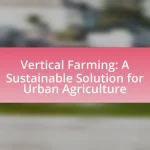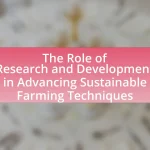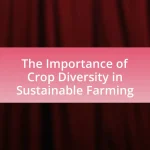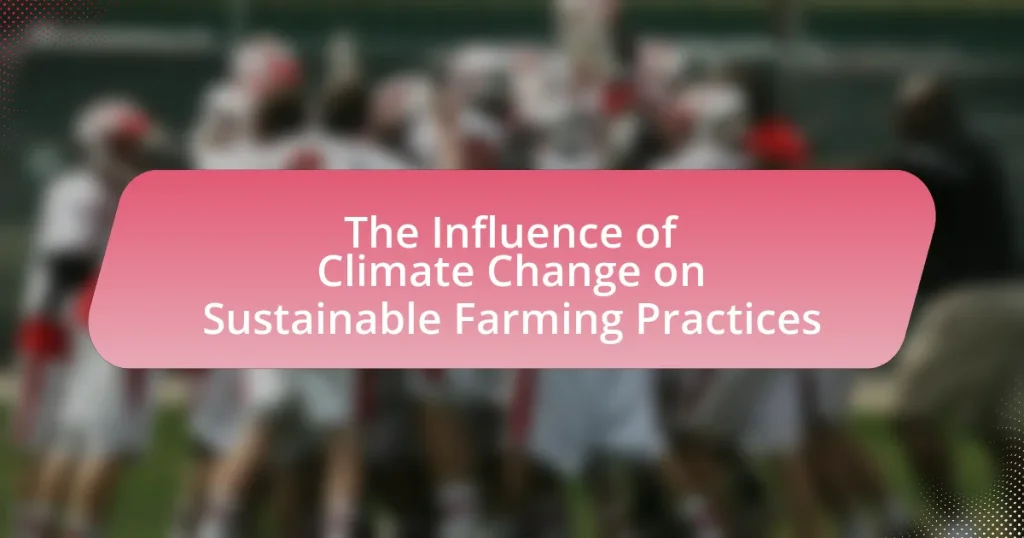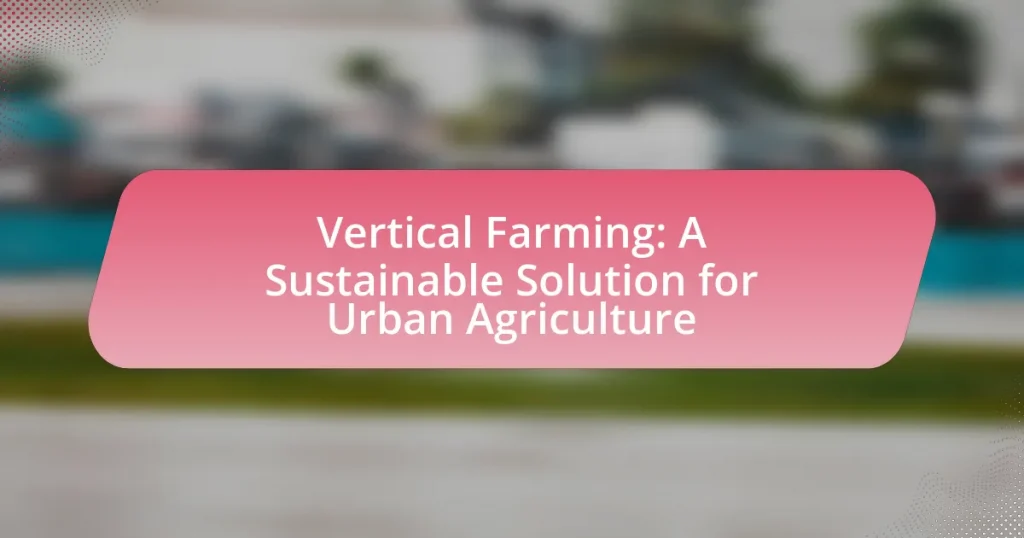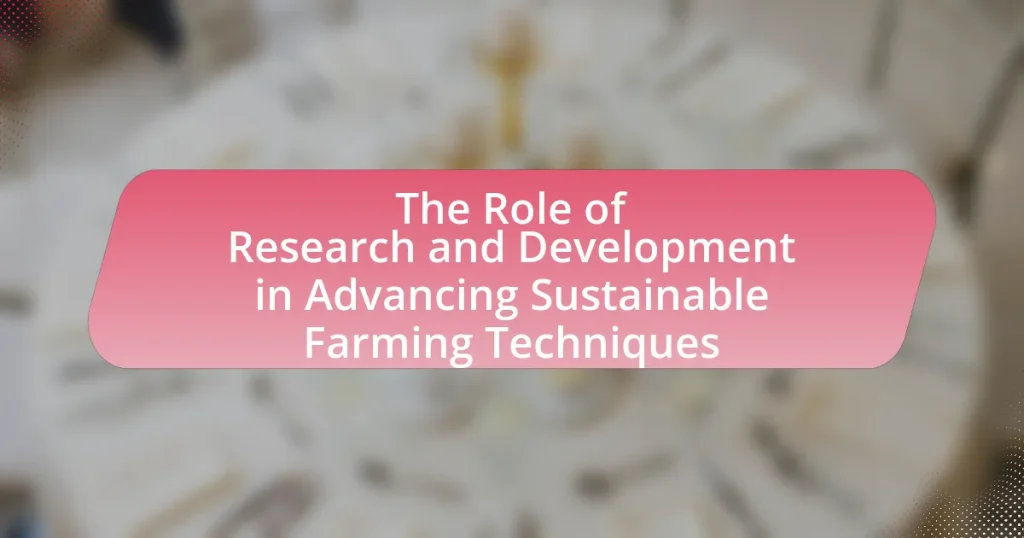The article examines the significant influence of climate change on sustainable farming practices, highlighting how altered weather patterns, reduced crop yields, and increased pest prevalence challenge agricultural productivity. It discusses specific climate factors affecting farming, such as temperature and precipitation, and emphasizes the importance of sustainable practices like crop rotation and organic farming in enhancing resilience. Additionally, the article outlines the economic pressures farmers face due to climate change and explores innovative techniques and policies that support sustainable agriculture. Overall, it underscores the necessity for adaptive farming methods to ensure food security and environmental sustainability in a changing climate.
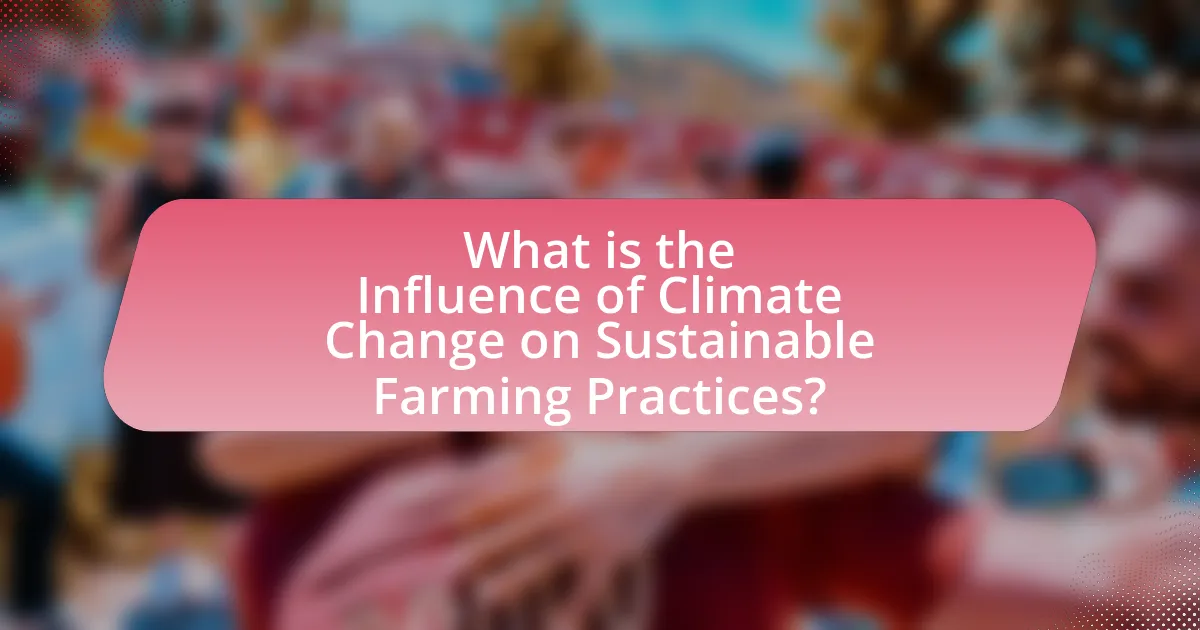
What is the Influence of Climate Change on Sustainable Farming Practices?
Climate change significantly influences sustainable farming practices by altering weather patterns, affecting crop yields, and increasing the prevalence of pests and diseases. For instance, rising temperatures and changing precipitation patterns can lead to reduced agricultural productivity, as evidenced by a study published in the journal “Nature Climate Change,” which found that climate change could reduce global crop yields by up to 25% by 2050. Additionally, sustainable farming practices, such as crop rotation and organic farming, are increasingly being adopted to enhance resilience against these climate impacts, as they promote soil health and biodiversity. Therefore, the influence of climate change necessitates a shift towards more adaptive and resilient sustainable farming practices to ensure food security and environmental sustainability.
How does climate change affect agricultural productivity?
Climate change negatively affects agricultural productivity by altering temperature and precipitation patterns, which can lead to reduced crop yields. For instance, studies indicate that a 1°C increase in temperature can decrease wheat yields by approximately 6% globally. Additionally, extreme weather events, such as droughts and floods, disrupt planting and harvesting schedules, further diminishing productivity. Research from the Intergovernmental Panel on Climate Change (IPCC) highlights that climate change could reduce global agricultural output by 10-25% by 2050, particularly in regions already vulnerable to food insecurity.
What specific climate factors impact crop yields?
Specific climate factors that impact crop yields include temperature, precipitation, humidity, and carbon dioxide levels. Temperature affects plant growth rates and development; for instance, optimal temperatures for many crops range between 20°C to 30°C, while extreme heat can lead to reduced yields. Precipitation influences soil moisture availability; studies show that a 10% decrease in rainfall can lead to a 20% reduction in crop yields. Humidity levels affect transpiration rates and disease prevalence; high humidity can promote fungal diseases, negatively impacting yields. Lastly, increased carbon dioxide can enhance photosynthesis, potentially boosting yields, but this effect is often countered by other stressors related to climate change.
How do changing weather patterns influence farming schedules?
Changing weather patterns significantly influence farming schedules by altering planting and harvesting times. Farmers rely on predictable seasonal weather to determine when to sow seeds and when to harvest crops. For instance, increased temperatures and erratic rainfall can lead to earlier springs, prompting farmers to plant crops sooner than usual. According to a study published in “Nature Climate Change,” regions experiencing shifts in climate have reported changes in crop phenology, with some crops flowering up to two weeks earlier than historical averages. This shift necessitates adjustments in farming practices to optimize yield and manage risks associated with unexpected weather events.
Why is sustainable farming important in the context of climate change?
Sustainable farming is crucial in the context of climate change because it reduces greenhouse gas emissions and enhances resilience to climate impacts. By employing practices such as crop rotation, agroforestry, and organic farming, sustainable agriculture can sequester carbon in soil, thereby mitigating climate change effects. Research indicates that sustainable farming methods can lower emissions by up to 30% compared to conventional practices, as reported by the Food and Agriculture Organization (FAO). Additionally, these practices improve soil health and biodiversity, which are essential for adapting to changing climate conditions.
What are the principles of sustainable farming?
The principles of sustainable farming include maintaining soil health, conserving water, promoting biodiversity, and reducing chemical inputs. These principles aim to create an agricultural system that is environmentally sound, economically viable, and socially responsible. For instance, maintaining soil health through practices like crop rotation and cover cropping enhances soil fertility and structure, which is essential for long-term productivity. Conserving water through efficient irrigation techniques helps to mitigate the impacts of climate change, as water scarcity becomes a pressing issue. Promoting biodiversity by integrating various crops and livestock can improve ecosystem resilience, making farms less vulnerable to pests and diseases. Lastly, reducing chemical inputs minimizes environmental pollution and health risks, aligning with sustainable practices that support both human and ecological well-being.
How does sustainable farming mitigate climate change effects?
Sustainable farming mitigates climate change effects by enhancing soil health, reducing greenhouse gas emissions, and promoting biodiversity. Practices such as crop rotation, cover cropping, and reduced tillage improve soil structure and carbon sequestration, which can store significant amounts of carbon dioxide. According to the Intergovernmental Panel on Climate Change, sustainable agricultural practices can reduce emissions by up to 30% compared to conventional methods. Additionally, sustainable farming supports diverse ecosystems, which can increase resilience to climate impacts and improve overall agricultural productivity.
What challenges do farmers face due to climate change?
Farmers face significant challenges due to climate change, including altered precipitation patterns, increased frequency of extreme weather events, and shifting pest and disease dynamics. These changes can lead to reduced crop yields and increased production costs. For instance, the Intergovernmental Panel on Climate Change (IPCC) reports that global crop yields could decline by up to 25% by 2050 due to climate-related factors. Additionally, rising temperatures can exacerbate water scarcity, making irrigation more challenging and costly. These factors collectively threaten food security and the economic viability of farming operations.
How do extreme weather events impact farming operations?
Extreme weather events significantly disrupt farming operations by causing crop damage, soil erosion, and reduced yields. For instance, heavy rainfall can lead to flooding, which destroys crops and makes fields inaccessible for planting and harvesting. Drought conditions, on the other hand, can lead to water shortages, severely impacting irrigation and crop growth. According to the National Oceanic and Atmospheric Administration (NOAA), the frequency of extreme weather events has increased by 30% over the past few decades, directly affecting agricultural productivity. Additionally, the Intergovernmental Panel on Climate Change (IPCC) reports that climate change is expected to exacerbate these events, further threatening food security and sustainable farming practices.
What economic pressures arise from climate change for farmers?
Climate change imposes significant economic pressures on farmers, primarily through increased costs and reduced yields. Farmers face higher expenses due to the need for advanced irrigation systems, pest control, and crop insurance as extreme weather events become more frequent. For instance, a study by the National Oceanic and Atmospheric Administration indicates that climate-related disasters have led to a 20% increase in crop insurance claims over the past decade. Additionally, changing weather patterns can result in lower agricultural productivity; the Intergovernmental Panel on Climate Change reports that crop yields for staples like wheat and maize could decline by up to 25% by 2050 in some regions. These factors collectively strain farmers’ financial viability and threaten their livelihoods.
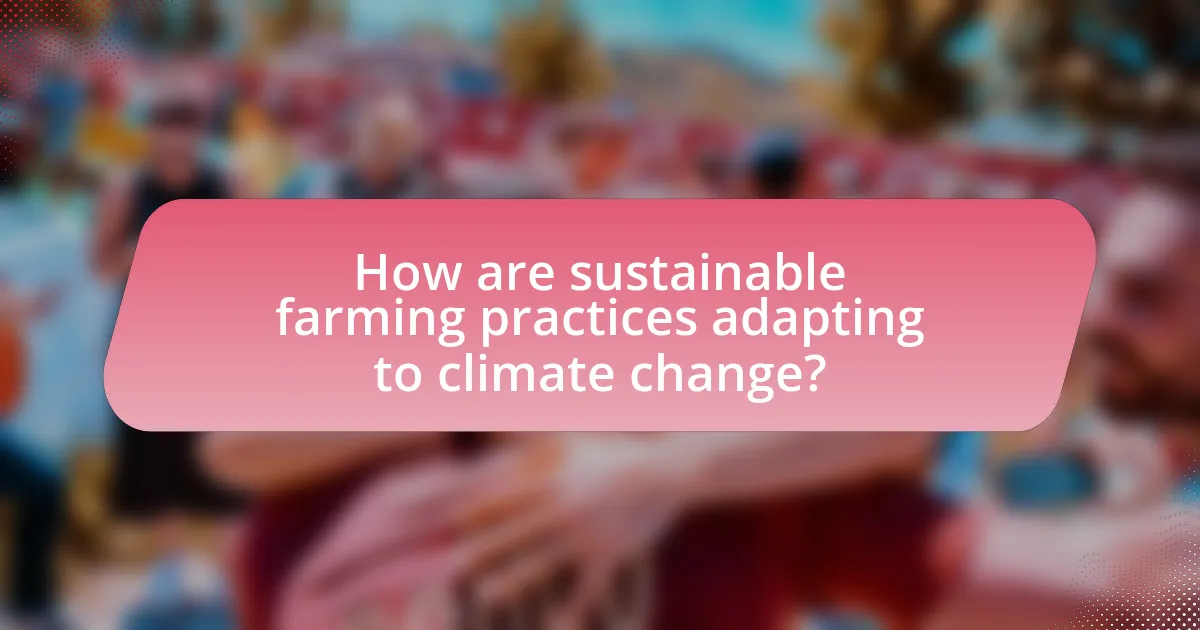
How are sustainable farming practices adapting to climate change?
Sustainable farming practices are adapting to climate change by implementing techniques such as crop rotation, agroforestry, and conservation tillage. These methods enhance soil health, increase biodiversity, and improve resilience against extreme weather events. For instance, crop rotation helps in pest management and soil fertility, while agroforestry integrates trees into farming systems, which can mitigate temperature fluctuations and improve water retention. According to a study published in the journal “Agricultural Systems,” these practices can lead to a 20-30% increase in crop yields under changing climate conditions, demonstrating their effectiveness in addressing the challenges posed by climate change.
What innovative techniques are being implemented in sustainable farming?
Innovative techniques being implemented in sustainable farming include precision agriculture, agroecology, and vertical farming. Precision agriculture utilizes technology such as GPS and IoT sensors to optimize field-level management regarding crop farming. This technique enhances resource efficiency, reducing water and fertilizer usage by up to 30%, as reported by the USDA. Agroecology focuses on ecological principles to create sustainable farming systems, promoting biodiversity and soil health, which can increase resilience to climate change impacts. Vertical farming, which involves growing crops in stacked layers, significantly reduces land use and can increase yield by up to 10 times compared to traditional farming methods, according to a study by the University of Controlled Environment Agriculture. These techniques collectively contribute to more sustainable agricultural practices in the face of climate change.
How does crop rotation contribute to sustainability?
Crop rotation contributes to sustainability by enhancing soil health, reducing pest and disease pressure, and improving crop yields. By alternating different crops in a specific sequence, farmers can maintain nutrient balance in the soil, as diverse plants have varying nutrient requirements and contributions. Research indicates that crop rotation can lead to a 20-30% increase in crop yields compared to monoculture systems, as it helps prevent soil degradation and nutrient depletion. Additionally, rotating crops disrupts the life cycles of pests and diseases, reducing the need for chemical pesticides, which further supports environmental health and biodiversity.
What role does agroforestry play in climate resilience?
Agroforestry enhances climate resilience by integrating trees with crops and livestock, which improves biodiversity and soil health. This practice mitigates climate impacts by increasing carbon sequestration, reducing soil erosion, and enhancing water retention. Research indicates that agroforestry systems can increase crop yields by 20-50% compared to conventional farming, thereby providing food security in changing climates. Additionally, agroforestry can buffer against extreme weather events, such as floods and droughts, by stabilizing ecosystems and providing shade and windbreaks.
Why is soil health critical in sustainable farming under climate change?
Soil health is critical in sustainable farming under climate change because it enhances resilience against extreme weather events and improves crop productivity. Healthy soil maintains moisture, supports nutrient cycling, and fosters beneficial microbial activity, which are essential for plant growth, especially in fluctuating climate conditions. Research indicates that healthy soils can increase agricultural yields by up to 20% under stress conditions, such as drought or heavy rainfall, thereby ensuring food security. Furthermore, soil health contributes to carbon sequestration, mitigating climate change effects by reducing greenhouse gas emissions.
What practices enhance soil health in changing climates?
Practices that enhance soil health in changing climates include cover cropping, reduced tillage, and organic amendments. Cover cropping improves soil structure, increases organic matter, and enhances biodiversity, which are crucial for resilience against climate variability. Reduced tillage minimizes soil disturbance, preserving soil structure and moisture, while organic amendments, such as compost, boost nutrient availability and microbial activity. Research indicates that these practices can lead to improved soil carbon sequestration, which is vital for mitigating climate change impacts. For example, a study published in the journal “Agriculture, Ecosystems & Environment” found that cover cropping can increase soil organic carbon levels by up to 1.5 tons per hectare annually, demonstrating their effectiveness in enhancing soil health under changing climatic conditions.
How does soil management affect carbon sequestration?
Soil management significantly enhances carbon sequestration by improving soil structure, increasing organic matter, and promoting microbial activity. Effective practices such as cover cropping, reduced tillage, and organic amendments lead to higher soil carbon stocks. For instance, a study published in “Nature Climate Change” by Paustian et al. (2016) indicates that adopting no-till practices can increase soil organic carbon levels by up to 25% over a decade. This increase in carbon storage not only mitigates climate change by reducing atmospheric CO2 but also improves soil health and fertility, creating a sustainable farming system.
What role do technology and research play in sustainable farming adaptations?
Technology and research are crucial in facilitating sustainable farming adaptations by providing innovative solutions and data-driven insights. Advanced technologies such as precision agriculture, which utilizes GPS and IoT sensors, enable farmers to optimize resource use, reduce waste, and enhance crop yields while minimizing environmental impact. Research contributes by developing sustainable practices, such as crop rotation and integrated pest management, which are informed by scientific studies demonstrating their effectiveness in maintaining soil health and biodiversity. For instance, a study published in the journal “Agricultural Systems” found that precision agriculture can reduce fertilizer use by up to 30%, thereby decreasing runoff and improving water quality. This integration of technology and research not only supports farmers in adapting to climate change but also promotes long-term sustainability in agricultural practices.
How are precision agriculture tools helping farmers adapt?
Precision agriculture tools are helping farmers adapt by enabling them to optimize resource use and improve crop management in response to climate variability. These tools, such as GPS-guided equipment, soil sensors, and data analytics platforms, allow farmers to monitor environmental conditions in real-time, leading to more informed decision-making. For instance, a study by the USDA found that farmers using precision agriculture techniques can reduce water usage by up to 30% while maintaining crop yields, demonstrating the effectiveness of these tools in enhancing sustainability and resilience against climate change impacts.
What research initiatives are focused on sustainable farming solutions?
Research initiatives focused on sustainable farming solutions include the Sustainable Agriculture Research and Education (SARE) program, which promotes sustainable farming practices through research and education across the United States. Another significant initiative is the Global Research Alliance on Agricultural Greenhouse Gases, which aims to enhance food security while reducing greenhouse gas emissions from agriculture. Additionally, the European Union’s Horizon 2020 program funds various projects aimed at improving sustainable agricultural practices in response to climate change. These initiatives are backed by extensive research and collaboration among scientists, farmers, and policymakers to develop effective strategies for sustainable farming.
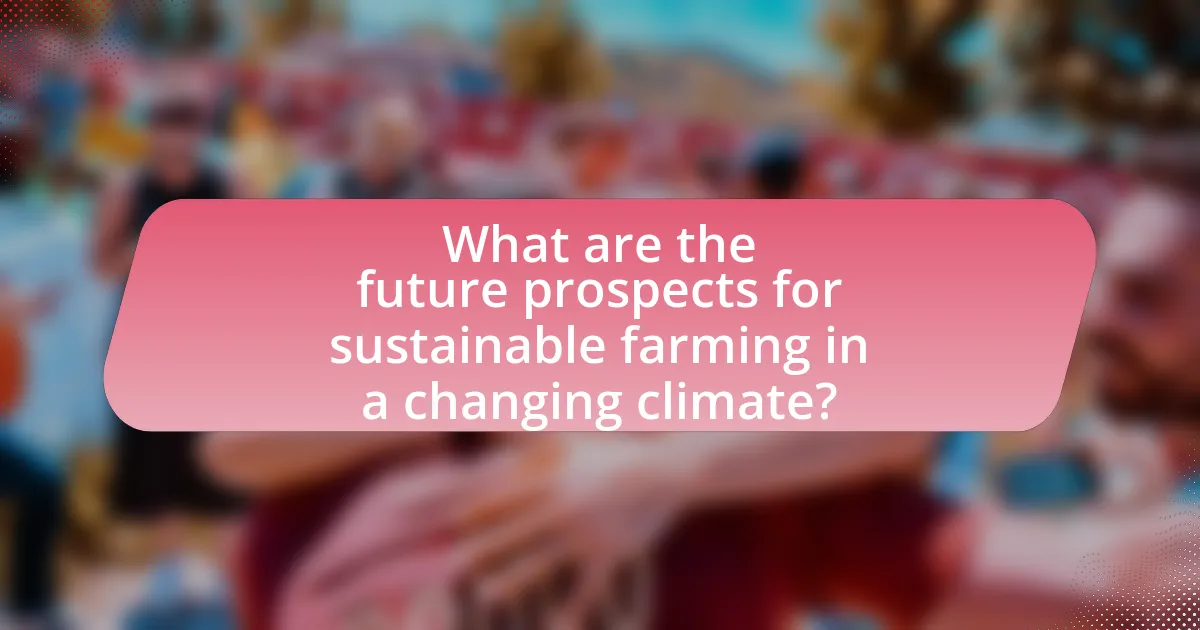
What are the future prospects for sustainable farming in a changing climate?
The future prospects for sustainable farming in a changing climate are increasingly promising due to advancements in technology and practices that enhance resilience. Innovations such as precision agriculture, which utilizes data analytics and IoT devices, enable farmers to optimize resource use and reduce waste, thereby improving sustainability. Additionally, practices like agroecology and regenerative agriculture are gaining traction, focusing on soil health and biodiversity, which are crucial for adapting to climate variability. According to a report by the Food and Agriculture Organization, sustainable farming practices can increase productivity by up to 58% while reducing greenhouse gas emissions by 30% by 2030. This evidence supports the notion that sustainable farming can effectively address the challenges posed by climate change while ensuring food security.
How can policy support sustainable farming practices?
Policy can support sustainable farming practices by providing financial incentives, regulatory frameworks, and educational resources that promote environmentally friendly agricultural methods. For instance, subsidies for organic farming and conservation practices encourage farmers to adopt sustainable techniques, while regulations can limit harmful practices that contribute to climate change. Research from the Food and Agriculture Organization indicates that policies fostering agroecological practices can enhance resilience to climate impacts, thereby supporting both sustainability and productivity in agriculture.
What regulations are being proposed to promote sustainability?
Proposed regulations to promote sustainability include stricter emissions standards for agricultural practices, incentives for organic farming, and requirements for sustainable water usage. These regulations aim to reduce greenhouse gas emissions, enhance soil health, and conserve water resources, which are critical in the context of climate change. For instance, the U.S. Environmental Protection Agency has introduced initiatives that encourage farmers to adopt practices that minimize environmental impact, such as precision agriculture and cover cropping, which have been shown to improve soil quality and reduce runoff.
How can subsidies encourage sustainable farming methods?
Subsidies can encourage sustainable farming methods by providing financial support that reduces the economic risks associated with adopting environmentally friendly practices. For instance, when governments allocate funds to subsidize organic fertilizers or cover the costs of implementing water-saving irrigation systems, farmers are more likely to transition away from conventional methods that may harm the environment. Research from the Food and Agriculture Organization indicates that countries with robust subsidy programs for sustainable practices see a significant increase in the adoption of techniques such as crop rotation and agroforestry, which enhance soil health and biodiversity. This financial incentive directly correlates with improved sustainability outcomes, demonstrating that targeted subsidies can effectively promote environmentally responsible farming.
What are the best practices for farmers to implement sustainable techniques?
Farmers can implement sustainable techniques by adopting practices such as crop rotation, cover cropping, reduced tillage, integrated pest management, and organic farming. Crop rotation enhances soil health and reduces pest and disease cycles, while cover cropping prevents soil erosion and improves nutrient retention. Reduced tillage minimizes soil disturbance, promoting carbon sequestration and biodiversity. Integrated pest management combines biological, cultural, and chemical practices to manage pests sustainably, reducing reliance on synthetic pesticides. Organic farming avoids synthetic fertilizers and pesticides, fostering a healthier ecosystem. These practices are supported by research indicating that sustainable farming can increase resilience to climate change, improve soil health, and enhance biodiversity, ultimately leading to more productive and sustainable agricultural systems.
How can farmers effectively manage water resources in sustainable farming?
Farmers can effectively manage water resources in sustainable farming by implementing practices such as rainwater harvesting, drip irrigation, and soil moisture monitoring. Rainwater harvesting allows farmers to collect and store rainwater for irrigation, reducing reliance on groundwater and surface water sources. Drip irrigation delivers water directly to the plant roots, minimizing evaporation and runoff, which is crucial in areas facing water scarcity. Soil moisture monitoring enables farmers to apply water only when necessary, optimizing water use efficiency. According to the Food and Agriculture Organization, these methods can lead to water savings of up to 50% compared to traditional irrigation techniques, demonstrating their effectiveness in sustainable farming practices.
What community resources are available to support sustainable farming initiatives?
Community resources available to support sustainable farming initiatives include local agricultural extension services, non-profit organizations focused on sustainable agriculture, and community-supported agriculture (CSA) programs. Agricultural extension services provide research-based information and technical assistance to farmers, helping them adopt sustainable practices. Non-profit organizations, such as the Sustainable Agriculture Research and Education (SARE) program, offer grants and educational resources to promote sustainable farming techniques. CSAs connect consumers directly with local farmers, fostering community support and encouraging sustainable practices. These resources collectively enhance the capacity of farmers to implement environmentally friendly methods, thereby addressing the challenges posed by climate change.
